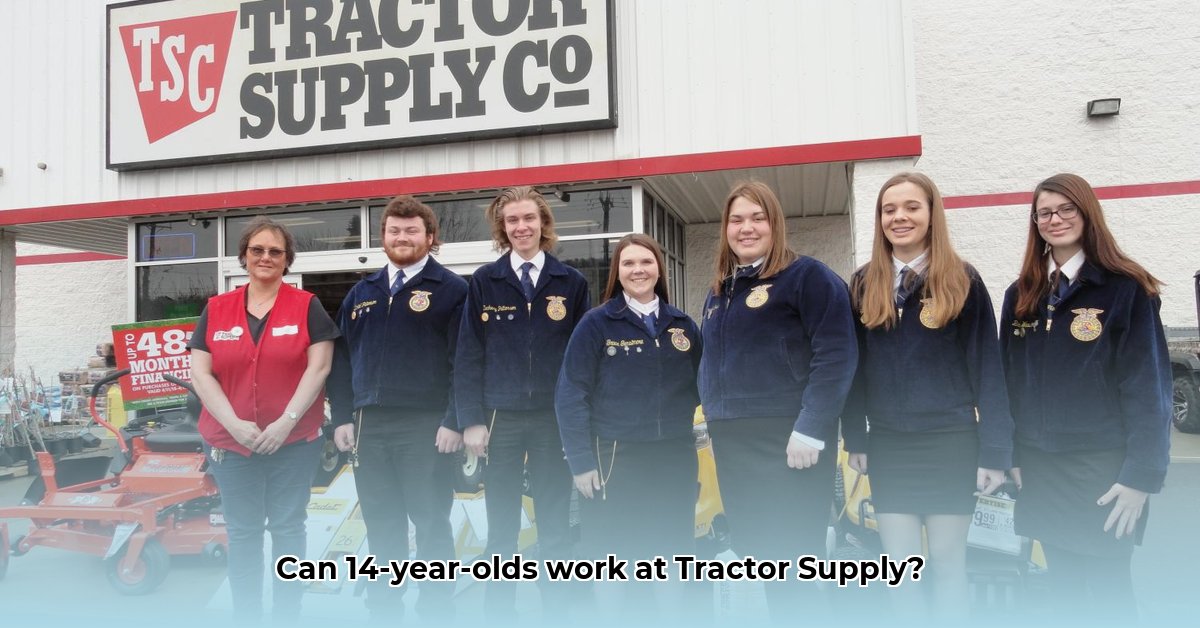
Finding summer or part-time work as a teenager can be challenging, particularly in rural areas. This guide explores whether Tractor Supply hires 14-year-olds and broader employment opportunities for rural youth. We'll examine relevant laws, Tractor Supply's hiring policies, and actionable strategies for teens, parents, communities, and businesses. For more detailed information on Tractor Supply's hiring practices, see this helpful resource: Tractor Supply Age.
Federal and State Laws: The Legal Landscape
The Fair Labor Standards Act (FLSA) (a federal law setting minimum wage, overtime pay, recordkeeping, and child labor standards affecting full-time and part-time workers in the private sector and in Federal, State, and local governments) sets minimum age requirements for employment. Most states mirror these federal guidelines, often prohibiting most employment for those under 16. These laws are designed to protect young workers from exploitation and ensure they have time for school and personal development. Does this mean no opportunities for young people wanting to work? Not necessarily.
Tractor Supply's Hiring Practices and Age Limits
Given the FLSA and related state laws, Tractor Supply, like many retailers, typically hires individuals aged 16 or older. Jobs often involve tasks requiring physical strength and potentially hazardous materials, making it difficult to comply with age-related restrictions for younger employees. Even for 16 and 17-year-olds, there are limitations on permissible work hours and job duties to ensure safety and compliance with labor laws.
Opportunities for 16 and 17-Year-Olds
For teens aged 16 and 17, securing employment at Tractor Supply remains possible. How can you improve your chances?
Directly Contact Tractor Supply: Visit the store in person or check their website for job postings. Speak with the manager about potential openings. A direct and enthusiastic approach can significantly increase your chances.
Highlight Appropriate Skills: Focus on roles aligning with your age and physical capabilities. Stocking shelves, assisting customers, or cashier duties are often suitable. Emphasize related skills in your application.
Showcase Your Strengths: Lack of prior work experience shouldn't deter you. Highlight volunteer work, school projects, or responsible chores illustrating your reliability and work ethic. This demonstrates your value as an employee.
Understand Child Labor Laws: Familiarize yourself with your state's child labor laws (easily accessible online) to know the legal limits on your work. This demonstrates initiative and responsible work habits.
Network Within Your Community: Connect with people in your area – church leaders, school counselors, and community organizations – who might offer leads or advice on job opportunities.
The Broader Context: Rural Youth Employment
Tractor Supply's hiring policies reflect challenges faced by rural youth. Limited job opportunities hinder skill development, income generation, and overall experience for teenagers. This can also negatively impact the economic vitality of their communities. What can be done to address this wider issue?
A Collaborative Approach to Solving the Problem
Addressing rural youth unemployment requires a combined effort:
- Government Agencies: Should ensure child labor laws are clear, manageable for businesses, and prioritize worker safety.
- Businesses like Tractor Supply: Could create more age-appropriate entry-level positions, potentially through internships or apprenticeships.
- Local Communities: Can develop job creation programs and provide skill-building opportunities for young people.
By working together, we can create more opportunities for rural teens while ensuring compliance with labor laws.
A Step-by-Step Guide for Teens Seeking Employment
Here's a five-step plan:
- Research: Understand age restrictions and permissible job duties within your state.
- Prepare: Craft a resume, highlighting even extracurricular activities that show work ethic.
- Apply: Submit applications both online and in person. Make a personal connection if possible.
- Network: Reach out to your community for potential job leads.
- Be Persistent: The job search takes time; don't get discouraged!
This collaborative approach not only helps teens find jobs but also strengthens the overall economic health of rural communities. Rural youth employment is a shared responsibility that benefits everyone involved.